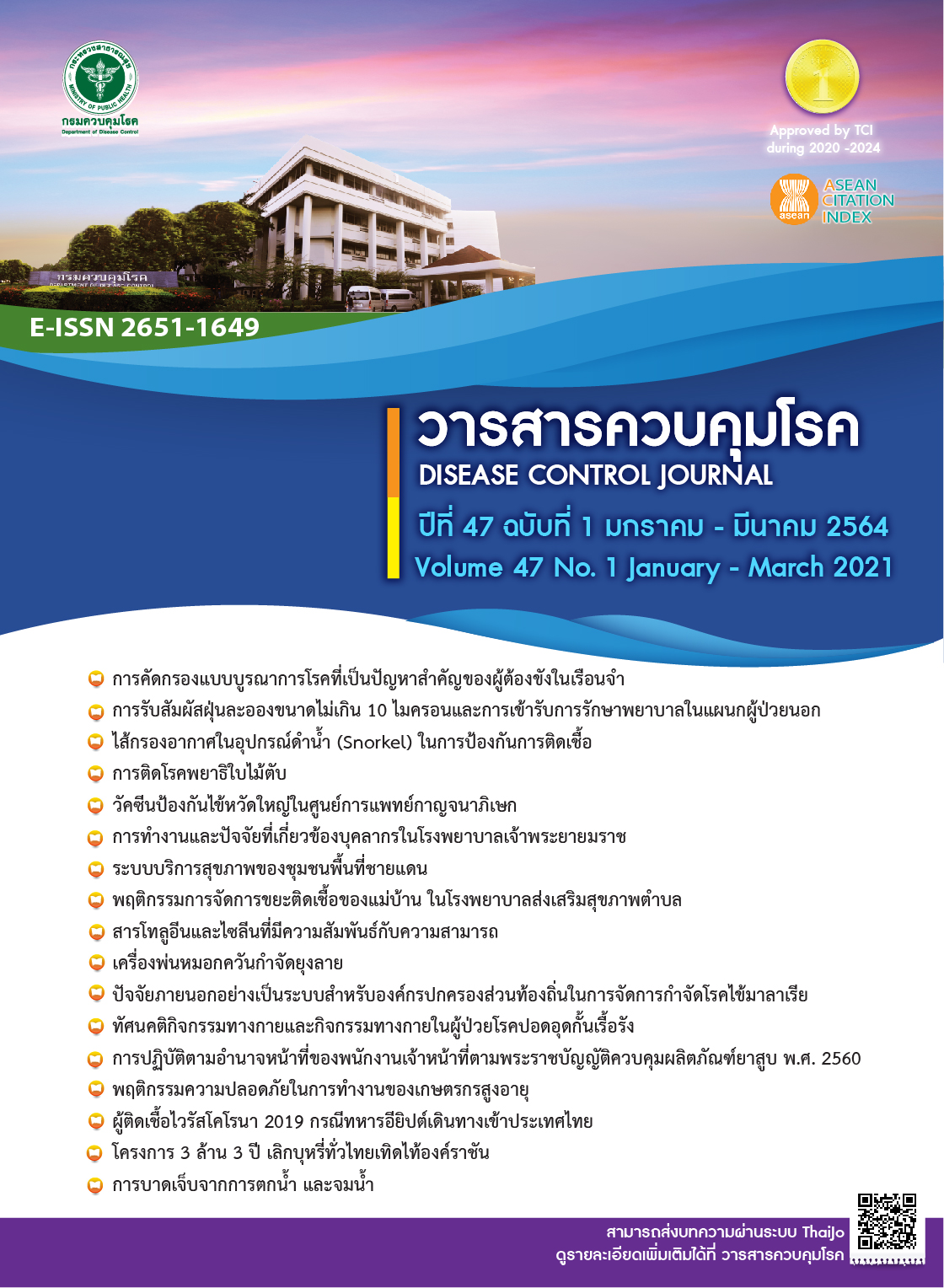Factors related to infectious waste management behavior of the maids who work in the health promoting hospitals in Nong Phai district, Phetchabun province
DOI:
https://doi.org/10.14456/dcj.2021.8Keywords:
infectious waste management, health promoting hospital, knowledge, attitude, behaviorAbstract
The purpose of this descriptive study was to determine the factors related to infectious waste management behavior of the maids who work in the health promoting hospitals in Nong Phai district, Phetchabun province. Data was collected from 30 maids that work in the hospitals by using a questionnaire that is comprised of personal information, knowledge, attitudes and their behavior towards infectious waste management. The data was analyzed using descriptive statistics including percentage, mean, minimum, and maximum, and then correlated by the chi-square test. The results showed that 60% of the maids in the health promoting hospitals had medium level of knowledge, while 40% of them had low knowledge regarding infectious waste management (Mean±SD, 14.27±3.85). All the maids had an attitude of 100% (Mean 40.00±0.96), while 19 of them (63.3%) had a high-level behavior, the other 11 only had a medium level of 36.7% (Mean 34.50±3.70). The personal factors, which include gender, age, duration of employment, the hospital policies regarding staff protocols, level of education, trainings completed, duty and attitudes, do not relate to the behavior regarding infectious waste management. The maids’ knowledge about infectious waste management is related to their behavior toward infectious waste management in the health promoting hospitals in Nong Phai district, Phetchabun Province, demonstrating a significance of 0.05 (p–value=0.01). Therefore, more in-depth knowledge should be taught to the maids so as to promote safe waste management in the health promoting hospitals.
Downloads
References
Jantana M. Infectious waste management of local authorities [dissertation]. Bangkok: National Institute of Development Administration; 2013. 240 p. (in Thai)
World Health Organization. Safe management of wastes from health-care activities [Internet]. Geneva. Department of Public Health; 2014 [cited 2018 May 1]. 124 p. Available from: https://apps.who.int/iris/bitstream/handle/10665/279788/ WHO-HIS-SDS-2018.10-eng.pdf
Patama P. A study of relation between knowledge and practice of the infectious waste management of employees at Siriraj hospital [dissertation]. Bangkok: Silpakorn University; 2011. 105 p. (in Thai)
UK. The management of waste from health, social and personal care RCN guidance [Internet]. London. The Royal College of Nursing; 2016 [cited 2019 Jul 1]. 124 p. Available from: https://www.herefordshireccg.nhs.uk/ library/infection-prevention-and-
control/sharps-and-waste/1092-rcn-waste-guidelines-april-14/file
Pollution Control Department. Data for infectious waste management [Internet]. 2019 [cited 2019 Nov 14]. Available from: http://www.pcd.go.th/info_serv/waste_infectious.htm (in Thai)
Bureau of Environmental Health. Trend for infectious waste of health care. Bangkok: Department of Health (TH); 2014. (in Thai)
Jomjun N. Knowledge and behavior for infectious waste management in the government hospital. KKU Journal for Public Health Research. 2008;5(3):49-51. (in Thai)
Angsumalee A. Relationships between knowledges and attitudes on infectious waste segregation and management of infectious waste segregation in clinics: a case study of Amphoe Pakkret, Nonthaburi Province [dissertation]. Bangkok: Mahidol University; 2013. (in Thai)
Srisukon L. Investigation, knowledge, attitude, and behavior concerning infectious waste disposal by the staff of private health centers in municipal area, Ubon Ratchathani [independent study]. Ubon Ratchathani: Ubon Ratchathani University; 2008. (in Thai)
Bloom BS. Human characteristics and school learning. New York: Mcgraw Hill Book; 1976.
Best JW. Research in education. 3rd ed. New Jersey: Prentice hall; 1977.
Arun K. Safety of maintenance technicians in Suan Sunandha Rajabhat University. Bangkok: Suan Sunandha Rajabhat University; 2012. (in Thai)
Siriphun S. Health conditions of garbage collectors: the case study of muncipalities in Nakhon Pathom province [independent study]. Bangkok: Silpakorn University; 2011. (in Thai)
Somkid T. Garbage collector’s participation in solid waste disposal in urban area of Thailand [dissertation]. Khon Kaen: Khon Kaen University; 2007. (in Thai)
Patcharee P. Knowledge attitude and behavior of nurse to infectious waste management in hospital: Case study in hospital subordinate to Ministry of Public Health Chanthaburi province [dissertation]. Bangkok: Mahidol University; 1997. (in Thai)
Department of Health. Manual for worker training of infectious waste in course of protection and suppression dispersion or hazard from infectious waste [Internet]. 2019 [cite 2019 Nov 14]. Available from: http://env.anamai.moph.go.th/ewt_dl_link.php?nid =542 (in Thai)
Soontaree P. Knowledge and practice in infectious waste management of medical personnel; Case study in Somdech Phra Pinklao Hospital [dissertation]. Bangkok: Mahidol University; 2000. (in Thai)
Hospers, J. An Introduction to Philosophical Analysis. Published by Pearson; 1996.
Downloads
Published
How to Cite
Issue
Section
License
Articles published in the Disease Control Journal are considered as academic work, research or analysis of the personal opinion of the authors, not the opinion of the Thailand Department of Disease Control or editorial team. The authors must be responsible for their articles.






